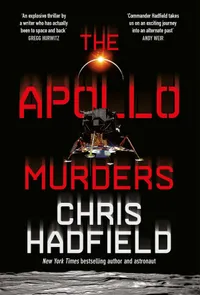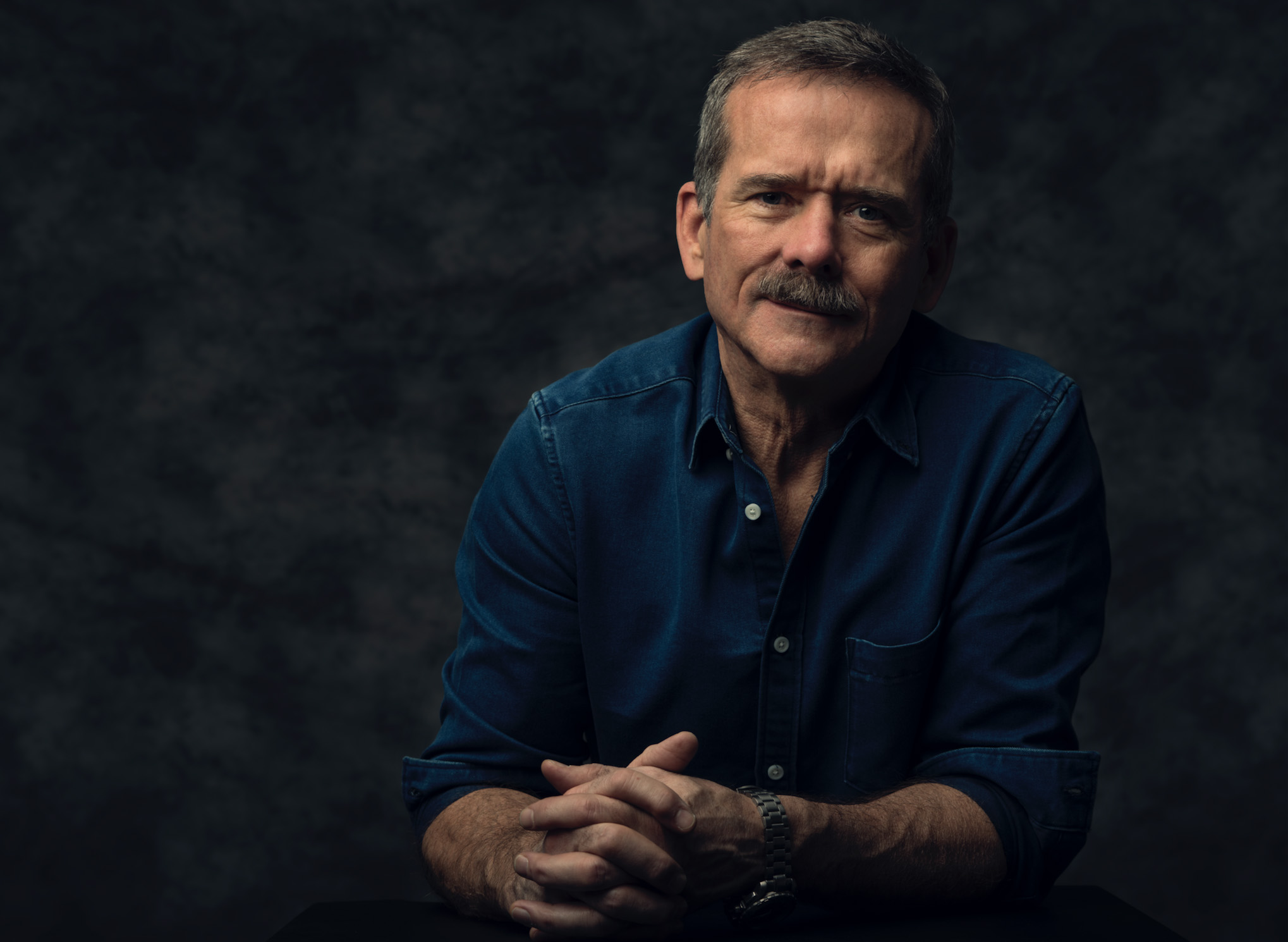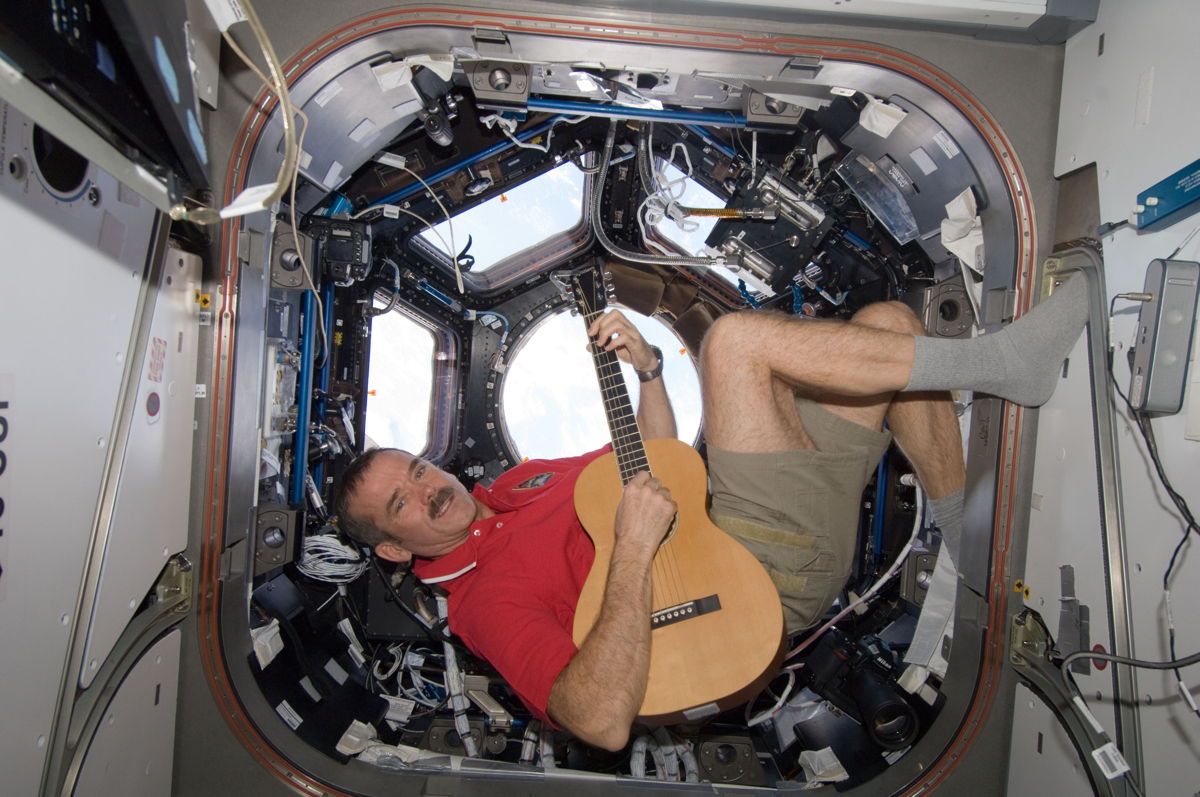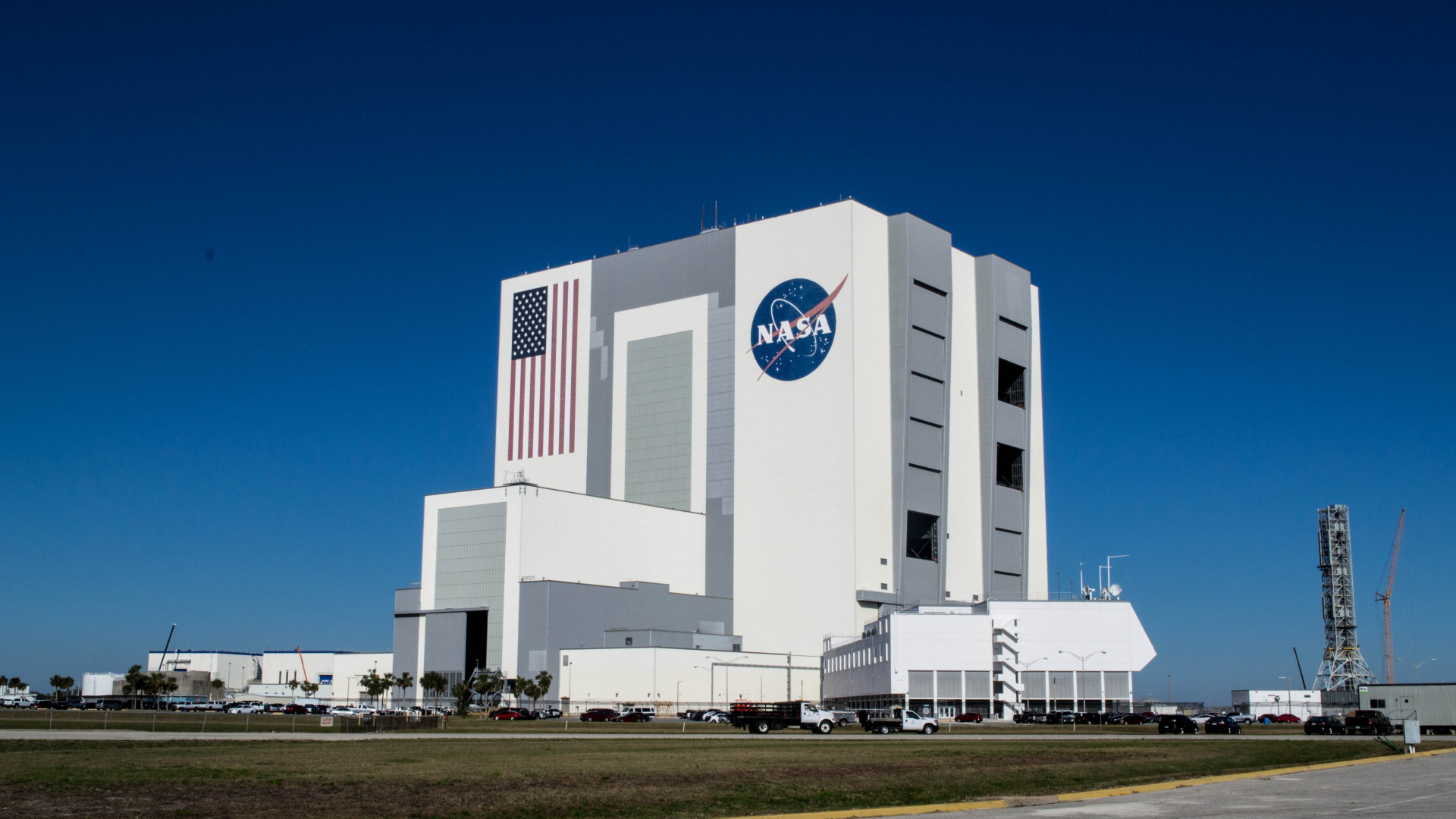A secret NASA moon mission launches in Chris Hadfield's alt-history novel 'The Apollo Murders' (book excerpt)
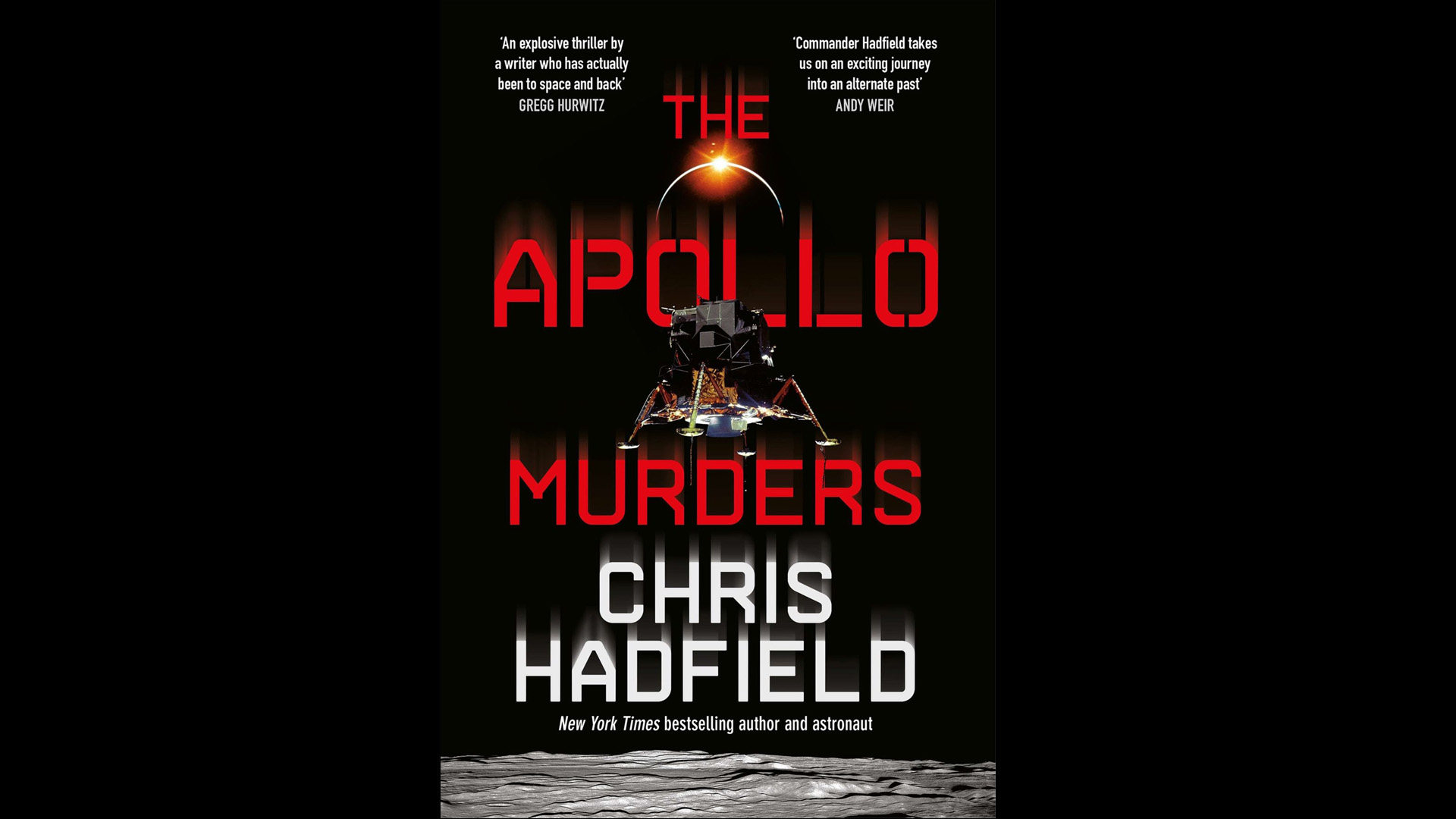
New York Times bestselling author, YouTube star, international speaker, and popular Twitter personality, Canadian astronaut Chris Hadfield, has a creative eye on the moon in his first dive into fiction with last week's release of "The Apollo Murders" (Mulholland Books, 2021). It’s a rousing adventure placed amid the tense days of the U.S.-Soviet Union space race in the 1970s following America's lunar landings.
Hadfield is a NASA veteran with three three spaceflights on his resume, having flown on NASA's space shuttles, as well as co-piloted a Russian Soyuz, helped build space station Mir and served as commander of the International Space Station.
He's also the co-creator and host of the BBC TV series "Astronauts: Do You Have What It Takes?" and aided in creating and hosting, with actor Will Smith, the National Geographic series "One Strange Rock." Hadfield's famous zero-g video rendition of David Bowie's "Space Oddity" became the first music video ever recorded in space and has racked up nearly 50 million views online.
“The Apollo Murders” rockets back to the past for an alternative history tale set in 1973 when NASA launches a final top-secret mission to investigate a crewed Soviet space station called Almaz. The clandestine flight continues to the moon as both Russian and American crews target a huge bounty hidden on the lunar surface.
Related: 12 Highlights of Chris Hadfield's High-Flying Career
Read moreRead less▼
The Apollo Murders (Mulholland Books, 2021): was $28 now $22.49 at Amazon
Save 20% on Canadian astronaut Chris Hadfield's first science fiction thriller "The Apollo Murders," available now from Mulholland Books.
When heated rivalries and political stakes erupt, Houston flight controller Kazimieras "Kaz" Zemeckis endeavors to keep the NASA crew together while staying one move ahead of his Russian rivals. However, not everyone aboard Apollo 18 is who they seem to be.
"For the actual writing of it I used the internet and my own experience very extensively," Hadfield told Space.com. "Where I lacked something, like did the Apollo command module have a speaker or did you always have to wear headphones to talk to Houston? I couldn’t find that anywhere online. So I just called Apollo astronauts that I know and asked them."
Breaking space news, the latest updates on rocket launches, skywatching events and more!
We spoke with Hadfield on the genesis of this new Cold War thriller, where his exhaustive research process led him, frequent misconceptions regarding astronauts on TV and in film, and how his friends, director James Cameron and actor Ryan Reynolds, offered smart advice on a potential Hollywood adaptation.
After the chat, stick around for a chapter preview from "The Apollo Murders." And if you're looking for more sci-fi goodness, check out our best space and sci-fi books of 2021 and guide to the best sci-fi TV shows based on books.
Interview: Astronaut Chris Hadfield, 'The Apollo Murders' author
Space.com: What compelled you to write "The Apollo Murders" and revisit the heyday of the space race?
Chris Hadfield: One motivation was just the challenge of it. The other is that it’s a different way to share the incredibly rare experience of spaceflight. When you put it into fiction you can really get into how everybody reacts and what everybody is thinking in a transient way. And the last piece was when a publisher came to me and said they had a great title for a book… "The Apollo Murders." Then that took a couple years of percolation but then the pandemic hit and I didn't travel so it freed up a bunch of time. Kind of a perfect storm of ideas and opportunity and desire and I’m pretty happy with the result. It came out better than I could have ever hoped.
Space.com: What detours did your research take for this project as opposed to your non-fiction writing?
Hadfield: My whole life and livelihood has been based on getting things right and the details are life or death as a test pilot and as an astronaut. When I'm writing the other books the details are endemic to it, but in this case I didn't ever fly on Apollo obviously, but there are enormous resources online. Every word spoken and every photograph and video taken from the entire Apollo program. First I had to find the right moment in history, and then find the world events so that was a fun detective moment.
The book has a secret Soviet spy space station called Almaz that really existed but the details of it were fascinating and only released not very long ago. And the fact that Almaz mysteriously malfunctioned and came apart in orbit and crashed in the spring of 1973. And Lunokhod [a Soviet robotic rover] on the surface of the moon mysteriously malfunctioned and died in the spring of 1973. Both those are real events and that provided some framework.
For the actual writing of it I used the internet and my own experience very extensively. Where I lacked something, like did the Apollo command module have a speaker or did you always have to wear headphones to talk to Houston. I couldn't find that anywhere online. So I just called Apollo astronauts that I know and asked them. The research was delightful, really learning the nuts and bolts and fine details of how it all worked and turning that into a story.
Related: Life in Space: Astronaut Chris Hadfield's Video Guide
Space.com: Why does that particular piece of history, the U.S.-Soviet space race, still hold such interest for people still?
Hadfield: It's the human heroic story and a seemingly impossible quest. It’s pitting humans against the elements and it was a nationalistic race. That taps into how people were raised and their value systems. And it was victorious! It succeeded. The gauntlet was thrown down by Kennedy the third week of May in 1961 and then he was assassinated so it gave it an almost sanctified necessity to the quest. It was also the dawn of the space age and this was the ultimate realization of what humans were capable of.
In the 10 years after Apollo there were more PhDs per capita than any time before or since. People saw themselves differently because of the example that Apollo had set in their lives and it still echoes now.
"Moonshot" is still a very common expression. Giving yourself an impossible goal and finding a way to prevail. It's human nature and the fact that it succeeded so globally and visibly has given it an enduring reputation.
Space.com: What are the biggest misconceptions about space travel and astronauts as private citizens suit up for brief trips to the stars?
Hadfield: Well, going for a ride is easy. How hard was it to be Wilbur Wright? He was just an aviator, but he worked for years and years and crashed and was horribly injured just trying to make airplanes fly at all. Now you buy a ticket on Delta and the drive to the airport is way more dangerous than riding in the airplane.
To be a professional astronaut is still very dangerous, very demanding, very deep and there's a whole universe to explore. I think tourism flights are a natural outgrowth and it's great that the technology is good enough to do that, just like it got with airplanes, cars, and trains.
But I think you can see it reflected in popular media. The standard memes of "Armageddon," where it's easier to train deep sea drillers like Bruce Willis to be an astronaut in a weekend than it is to train an astronaut how to run a drill. It’s kind of comical. Then if you watch "First Man" or "Ad Astra," or hear the lyrics to "Space Oddity" or "Rocketman," there's sort of this weird public perception that space flight is lonely and sad. It is not. It’s fantastic and joyful and rich and human. And maybe the misperception that all astronauts are the same. They're just as varied and rich and different with different objectives. We're all extremely good at a subset of human tasks and that means there’s still a wide variety of people involved.
Space.com: Which part of your astronaut experience were you able to inject into "The Apollo Murders?"
Hadfield: Realism and personal experiences that could then be reflected in the actions of the characters in the book. Over half the characters in the book are real people and 95% of what happens in it is real. And I think that's important because it’s not fantasy or science fiction, this is alternative history fiction that’s a small turn off the real path of history.
Space.com: There are rumors that James Cameron and Ryan Reynolds are interested in your novel as a possible film adaptation. What can you add to that notion and will you be involved?
Hadfield: I'm friends with them both. In fact, James was nice enough to read it as one of my early proofreaders. He made two really key, very small plot tweaks that made a lot of sense. He'd written "Terminator" and "Aliens" and "Titanic" and he really understands how to tell a story and what you need to let the viewer or the reader in on at what time. He and Ryan gave me strong advice about what to do with the folks that want to turn it into a movie. And who would be a reputable house so it didn't turn into "Gravity," where it's just execrable in its attention to detail.
"Gravity" is so insulting to women and women astronauts and girls who dream of being astronauts. I definitely don’t want a movie made of the book that makes me cringe. I’m in no hurry to make a bad movie out of this. If we're going to do it, I want to do it right!
Space.com: What do you hope readers take away from "The Apollo Murders" after the final page?
Hadfield: I'm hoping that everyone just loves it as a story, as an amazing fictional thriller. But also that they have a better feel for what it’s like to be an astronaut or a cosmonaut. And what the human experience is like and what types of people it took then and it still takes now. Mostly I want them to like the story and love the thing that I wove. Reactions so far are amazing but it all seems kind of otherworldly to me to this point. It's just an interesting way to share the rareness of the experiences that I've had.
Related: Astronaut Chris Hadfield in Orbit: 8 Amazing Space Moments
Enjoy an exclusive chapter excerpt from Chris Hadfield's "The Apollo Murders."
Gene Kranz, buzz-cut, gruff and competent, looked around the conference room at the team gathered there. Young men, mostly, and a handful of women. He was the lead flight director assigned to Apollo 18. With launch only three months away, he’d summed up the day’s work by telling them that he was pleased there had been no major screwups during the six-hour simulation, either by the all-rookie crew or the Mission Control team. Gene had been a flight director since the first Gemini mission, and after six Apollo Moon landings, he treated this one as almost routine, even though he knew that almost anything could go wrong.
“Any questions?” he asked.
Kaz raised his hand. “Flight, could I have a word with you and the crew after debrief is done?”
Gene made eye contact with each of his console engineers. No question marks on any of the faces. “Sure, I think that’s now. Thanks. Everyone else, you’re cleared to go.” The room emptied like a class dismissed, leaving only Tom, Luke and Michael, the prime crew, and Chad, the backup commander. They and Gene Kranz all looked at Kaz expectantly as he walked to the blackboard at the front of the room and picked up a piece of chalk.
“You all know that the Russians just landed a rover on the Moon, right?” Kaz said. “Well, they’re about to launch a thing called Almaz, a space station designed exclusively for spying, like MOL was sup- posed to be.” He turned and wrote “ALMAZ” in block letters.
“According to our best intel, Almaz’s camera will be powerful enough to easily see things down to the size of a small car.” He let the national security implications of that sink in for a few seconds. They were all military men, including Gene, who’d flown fighters in Korea. They knew of the secret testing going on out of sight at remote airfields like Edwards in California and Area 51 in Nevada.
“Our sources say it looks like they’ll be ready to launch Almaz in early April, unmanned. Once they’ve made sure it’s fully operational, they’ll send cosmonauts up on a Soyuz to crew it, and then they’ll start taking pictures.” Kaz paused to let that sink in before drawing the line to their own mission.
“The Joint Chiefs, with the approval of the president, want to use Apollo 18 to take a close look at Almaz in Earth orbit before the Soviet crew gets there. The Air Force just let NASA know on Friday, and I’ve been sent down here to brief you ASAP.”
Tom said, “Wait—are we still going to the Moon?” He sounded rattled.
“Yes.” Kaz turned to the chalkboard and drew a large circle. “Earth,” he said, pointing. Then he drew a shape that looked like an off-kilter hula hoop surrounding it. He pointed at the spot where the hoop’s curve was highest.
“The Soviets are launching Almaz from here, in Baikonur, fifty-two degrees north of the equator.” He traced the curve with his finger, show- ing where it descended behind the globe and reappeared in the south. “Apollo 18 has to match that orbit, so after launch, you’ll need to steer up the Florida coast.”
“Can’t do it,” Gene said immediately. “If we don’t launch the Saturn V straight east out of Canaveral, we don’t get the added speed of the Earth’s spin, Kaz. Eighteen’s too heavy. We’re just making it as it is.”
“Agreed.” Kaz quickly sketched the Saturn V rocket, Apollo Com- mand Module and Lunar Module, stacked for launch. “To lighten the load, we need to take everything off the mission that isn’t abso- lutely needed.”
He drew an X on the LM. “That means no experiments on this mission and minimal time for Bulldog on the lunar surface.” Another X on Bulldog’s exterior. “We won’t be carrying a rover.” Kaz looked at each of them, then drew Xs on the Command Module and the rocket. “Bare minimum gear in Pursuit, and a stripped-down Saturn V too. We’ll need to be creative, and Washington is looking to you for more ideas. Our best estimates show we can just make it.”
Michael said, “Let me get this straight. We launch up the east coast, and instead of heading to the Moon, we stay in Earth orbit long enough to go find this”—he glanced at the blackboard—“Almaz.” He looked back at Kaz. “We hang around taking pictures or whatever, and then we’re GO for TLI?” Trans-Lunar Injection—firing the rocket motor that accelerated them to escape velocity out of Earth orbit, headed for the Moon.
“That’s right,” Kaz confirmed.
Luke Hemming spoke, his voice incredulous. “With no experiments to run and no rover, what are Tom and I doing on the Moon?”
“I was just about to get to that,” Kaz said. “With the added time and fuel needed to intercept Almaz, they’ve stripped your time on the Moon to deal with only the highest military priorities. And those just changed.” “Christ!” Tom muttered, thinking of the new pressure his crew was going to be under for the next three months, made even more intense by the inevitable new layers of secrecy.
“The Soviets landed their rover in a crater called Le Monnier, on the edge of Mare Serenitatis.” Kaz drew a second circle to represent the Moon, and two smaller circles to the upper right, labeling them “Serenitatis” and “Le Monnier.” “It’s about a hundred miles north of where
Apollo 17 landed—and it’s not where the Soviets said they were going to land. The DoD wants you to go find out why the Russians are there.”
He looked directly at Tom and Luke. “So, gentlemen, you are headed to Mare Serenitatis. The Sea of Serenity.”
Luke rolled his eyes. “Idiots!” he muttered.
“Okay, it boils down to two main new objectives,” Gene said. “One—do a rendezvous and close approach to this Almaz, and linger there long enough to accomplish the DoD’s objectives.” He thought a second. “Any idea what success looks like to them, how much maneuvering will be involved and how long we’ve got there?”
“On the order of an hour, maybe two,” Kaz said. “You’ll need to burn some fuel in order to position Pursuit to take detailed photos. Success is a close look-see. Nothing the Soviets would see as hostile.”
“Then we land in the”—Gene glanced at the blackboard—“Le Monnier crater, where we do how many EVAs?” E-V-As, or Extra Vehicular Activities.
“Our first guess is that one moonwalk is all we’ll have oxygen and fuel reserves for,” Kaz replied.
Gene stared into space for several seconds, calculating. They hadn’t saved Apollo 13 by guessing. “We’ll see about that. But for now, we plan on one EVA. What exactly does the DoD want Tom and Luke to do on the Moon?”
Kaz counted on his fingers. “A detailed survey of the area. A close- up of the Soviet rover to check out its latest sensors and discern its purpose. Retrieval of rock and dust samples, to see what is so interest- ing to the Russians.”
“Michael can get good area imagery passing overhead,” Gene said. “We’ll lower his orbit as close to the surface as we can.”
Michael added, “I’ll need another long lens for the Hasselblad.” Gene nodded.
Kaz looked around at the group, now all deep in thought, revising, replanning, updating their options. Like five high-speed problem-solving computers.
Tom broke the silence. “A more fundamental ops question, Kaz.
Who came up with this and who’s actually in charge?”
Kaz paused. Spaceflight, like test flying, relied on the crew’s sense of control. Al Shepard, America’s first astronaut, had set the tone when he sat atop his Mercury rocket after hours of delay and said, “Why don’t you fix your little problem and light this candle?” You couldn’t tell a test pilot or an astronaut that their opinion mattered less than the people pulling the strings. Or a flight director, either, especially not one as experienced as Gene Krantz.
“We want to keep Apollo 18 as close to a normal mission as possible. Training, development, launch, flight ops and return will all be run by NASA, as usual. The difference will be at the management level. In addition to your Flight Ops Department here in Houston, representatives from the Air Force, the National Security Agency and the White House will work together. They’ll have their people here starting later this week, and they’ll be around throughout the flight.”
Chad, who had remained quiet until now, laughed out loud. Kaz knew these men’s years in the military had ingrained in them a mistrust of political meddling, especially with NSA spooks involved.
Luke shook his head, summarizing it in US Marine terms. “What a clusterfuck.”
Tom looked around at his crew. “This is actually going to be pretty interesting, guys. We still have the mission components we’ve been training for, but with added pieces that make perfect sense for us as military astronauts. A chance to do some stuff that no other Apollo crew has done—rendezvous with a non-cooperative foreign target in Earth orbit, and run what is essentially a military reconnaissance op on the Moon.”
Chad piped up. “It’s going to require some really efficient flying. Previous missions’ fuel reserve margins are going to have to be shaved all the way down the line.” He looked pointedly at Michael, Pursuit’s pilot, and Michael nodded soberly.
“So, Kaz, what exactly is your role in this?” Gene asked.
“They sent me down here as liaison—to translate what Washington wants for you, and to tell Washington what you can deliver. My aim is to free you guys up to concentrate on training while I run interference with management.”
Luke was the one who laughed aloud this time. “Mismanagement.” Gene spoke again. “So you need to be in on everything for this to work, Kaz. We’re going to be buried in the details, working the problem, building something that will hold together. I’m going to need you in
Mission Control from here on out, attending all the sims.”
Kaz nodded. “Of course, Gene. I figured as much, and that’s what I told the folks in Washington would happen.”
“Kaz, when you say ‘Washington,’ who do you mean?” Tom asked. “It’s been—what, five years since your accident at Pax? Who exactly are you working for these days?”
“It’s complicated. Legally, I still belong to the Navy. They paid for my graduate work at MIT after I recovered. But during my time there, the Air Force started asking me to advise directly on MOL and SIGINT issues. I ended up talking with the NSA multiple times, and have been called to brief the White House and the CIA, assessing Soviet space assets. I report directly to the Vice Chief of Naval Ops and do my best to keep my one eye focused on the big picture for him, but I spend a lot of time farmed out to other organizations.”
Kaz made sure he had everyone’s attention, then said, “One more thing. The official briefings with the NASA folks start here tomorrow. What I’ve told you now is for your ears only. Don’t even tell your wives, please.” The men all nodded. Of them, Gene, Tom and Michael were married.
Kaz turned to erase the blackboard, rubbing to remove all traces. So far, so good, but he knew just how complicated it was going to get. He expected Washington hadn’t told them the half of it yet.
"The Apollo Murders" is available now at bookstores and online outlets.
Join our Space Forums to keep talking space on the latest missions, night sky and more! And if you have a news tip, correction or comment, let us know at: community@space.com.
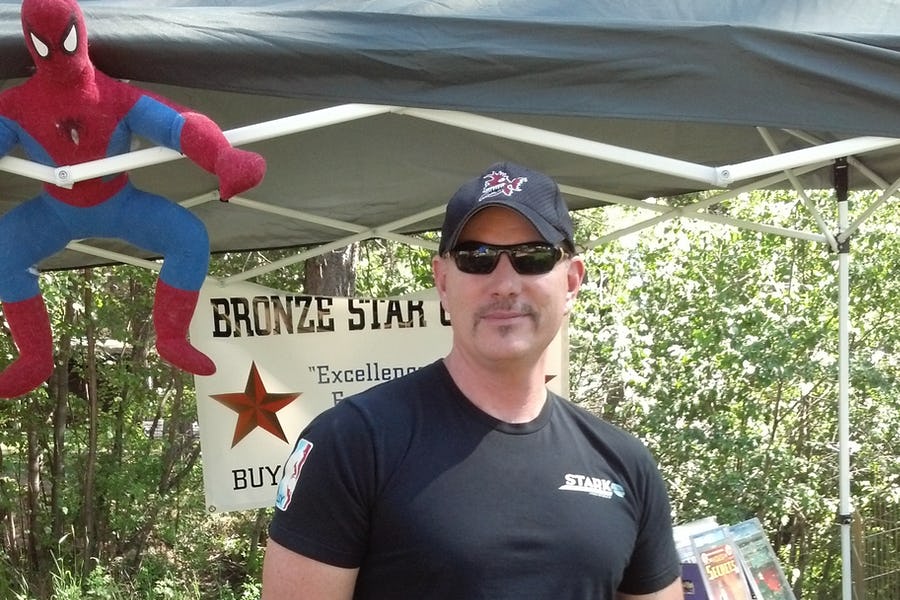
Jeff Spry is an award-winning screenwriter and veteran freelance journalist covering TV, movies, video games, books, and comics. His work has appeared at SYFY Wire, Inverse, Collider, Bleeding Cool and elsewhere. Jeff lives in beautiful Bend, Oregon amid the ponderosa pines, classic muscle cars, a crypt of collector horror comics, and two loyal English Setters.
